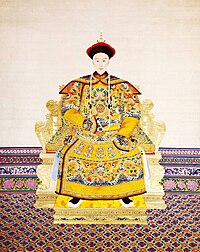This article possibly contains synthesis of material that does not verifiably mention or relate to the main topic. (August 2010) |

During the Manchu–led Qing dynasty, the economy was significantly developed and markets continued to expand especially in the High Qing era, and imperial China experienced a second commercial revolution in the economic history of China from the mid-16th century to the end of the 18th century.[1] But akin to the other major non-European powers around the world at that time like the Islamic gunpowder empires and Tokugawa Japan, such an economy development did not keep pace with the economies of European countries in the Industrial Revolution occurring by the early 19th century, which resulted in a dramatic change described by the 19th-century Qing official Li Hongzhang (who promoted the Self-Strengthening Movement) as "the biggest change in more than three thousand years" (三千年未有之大變局).[2]
Critics of the Qing, some of whom may be motivated by Chinese nationalism and anti-Qing sentiment, argue that the specific actions and policies of the Qing dynasty held the nation-state of China back during its rule, when the Industrial Revolution which occurred in Europe by the 19th century led to a Great Divergence in which China lost its early modern economic and industrial lead over the West which it had previously held for more than a millennium. According to the critics, the advances in science and technology and economic development in the preceding Song and Ming dynasties moved China toward a modern age, but the restrictions placed on commerce and industry and the persecution of non-orthodox thought after the transition from Ming to Qing in the 17th century caused China to gradually stagnate and fall behind the West and led to the century of humiliation.
Scholars outside China generally disagree with such an argument, and many scholars instead emphasize the positive effects of the Qing dynasty's order on the Chinese economy. At the same time, American scholar Kenneth Pomeranz rejects the assertion that "certain Asian societies were headed toward an industrial breakthrough until Manchu or British invaders crushed the 'sprouts of capitalism'",[3] although he suggests that the Qing revitalization of the state may have impeded the growth of "fashion".[4] In conclusion, he sees the Great Divergence as resulting primarily from what happened in the West, rather than what failed to happen in the Qing Empire. He adds that the difference in the West that facilitated the Industrial Revolution was not accumulated past "progress" or a more inventive mindset but rather a number of historically particular "contingencies", above all Europe's colonial exploitation of the New World through the use of slave labor from Africa.[5]
- ^ Rowe 2010, p. 123
- ^ "Politics, Poetics, and Gender in Late Qing China". Retrieved August 30, 2023.
- ^ Pomeranz 2000, p. 206
- ^ Pomeranz 2000, p. 155
- ^ Rowe 2010, p. 149
